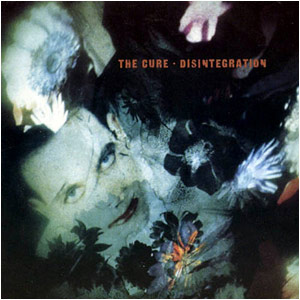
Disintegration
Rhino
Before the release of Disintegration, it seemed like the Cure couldn’t get any bigger (in several senses of the word). They’d released the multi-faceted double-album, Kiss Me, Kiss Me, Kiss Me, as their eighth full-length, spawned their most successful single to date, “Just Like Heaven,” and toured coliseums around the world. It seemed like the band’s cult of dedicated followers had expanded as much as could be possible. Surely the Cure’s peculiar, mopish pop would never hold the widespread appeal of the U2s and REMs of the world.
The suits at Elektra certainly didn’t think so—or at least not judging by the album that singer Robert Smith turned into them. Not only was the vast majority of Disintegration decidedly gloomy, but these songs averaged closer to the five-minute mark than the acceptable radio length of two or three minutes. Smith himself would later lump it in as part of a trilogy that also included the decidedly difficult Pornography. The singer stuck to his guns, though, and insisted Disintegration be released as is. His instincts were right, of course, with the record selling more than three million copies and the single “Lovesong” reaching the number 2 position on the U.S. charts. This record thrust the Cure over the top to the kind of stardom that’s well beyond the black-clad dedicated.
After reissuing almost the entirety of the Cure’s back catalog, Rhino has released Disintegration in a remastered and expanded three-disc form. The remastering was overseen by Smith himself, as was the combing of the vaults for a second CD of demos and a few rarities. This second CD is mostly instrumental rough drafts, though it does include a version of Judy Collins’ “Pirate Ships” that Robert recorded on his own as well unreleased cuts like “Noheart,” Esten,” and “Delirious Night.” Disc three is an expanded version of Entreat (fittingly called Entreat Plus), a live album recorded at Wembley Arena in 1989. While these bonuses might get true-blooded fans riled up, casual listeners probably won’t really get much from these alternate versions.
Disintegration is probably the last important Cure album. Subsequent records would come off as Cure-by-numbers, with Smith essentially treading water for nearly two decades. But Disintegration was truly something special, an album that was the culmination of the gloomy aesthetics and pop sensibilities that Smith and his troupe had long been cultivating. Here, Robert no longer needed to separate his songs into “the light” and “the dark.” He was now capable of bringing both qualities to one song. Witness “Pictures of You.” The song’s central theme is loss, but Smith integrates enough sparkling pop melodies that it feels bittersweet at worst (or best). Even at more than seven minutes, the song’s epic sweep still seems lighter than air. “Last Dance” and “The Same Deep Water As You” aren’t quite so breezy, but while Smith dives into the depths of his broken heart, it never seems as life-or-death as on Pornography or Faith. Even the playful spider-to-the-fly send-up, “Lullaby,” manages to keep from being cheesy. The Cure had made better records during their career, but none as perfect.
Stephen Slaybaugh
PAST PERFECTS
Refused, The Shape of Punk to Come
The Jon Spencer Blues Explosion, Now I Got Worry and Controversial Negro
The Moles, Untune the Sky
Jeff Eubank, A Street Called Straight
Tommy James & the Shondells
Destroyer, City of Daughters, Thief, and Streethawk: A Seduction
Big Audio Dynamite, This Is Big Audio Dynamite
Elliott Smith, Roman Candle and From a Basement on the Hill
Nick Cave and the Bad Seeds Reissues Part Two
Black Tambourine, Black Tambourine
Paul Revere & the Raiders, The Complete Columbia Singles
The Jon Spencer Blues Explosion, Dirty Shirt Rock 'n' Roll: The First Ten Years
The Plimsouls, Live! Beg, Borrow & Steal
Pavement, Quarantine the Past
